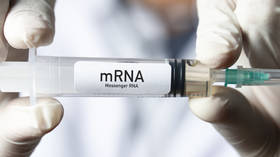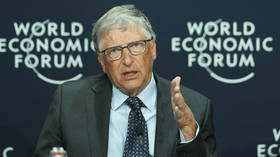Gates Foundation announces new funding for ‘low-cost’ mRNA vaccine in Africa

The Bill and Melinda Gates Foundation has announced that it is committing $40 million in funding to enhance access in parts of Africa to a “low-cost” mRNA vaccine research and manufacturing platform for targeted protection against the various diseases afflicting the continent.
The non-profit organization said on Monday that Quantoom Biosciences, a Belgian biotech company, will receive $20 million to “further advance the technology and lower costs for commercialization.” The Institut Pasteur de Dakar in Senegal and Biovac in South Africa have each been allocated $5 million to purchase the technology, the foundation stated.
“The Gates Foundation will grant another $10 million to other LMIC [low- and middle-income countries] vaccine manufacturers to be named,” it announced.
An mRNA vaccine employs a method that determines what part of a virus the human immune system should target in order to kill a pathogen.
While vaccines made using mRNA is said to have revolutionized the global response to the Covid-19 pandemic, access to care was unequal, prompting efforts to use this technology for combating existing threats that disproportionately affect lower-income nations, like malaria and tuberculosis.
Earlier this year, the World Health Organization (WHO) established a technology transfer hub in Cape Town, South Africa, to facilitate the production of sustainable mRNA vaccines. It also aimed to strengthen regulatory capabilities in order to expedite regional approval and distribution of mRNA vaccines in LMICs. Afrigen Biologics, one of the hub’s partners, is already producing Africa’s first mRNA vaccine for Covid-19 in the lab.
The Gates Foundation, in addition to funding efforts to eradicate diseases such as malaria and polio, according to reports earlier this year, is the second largest donor to the WHO. It poured enormous amounts of money into vaccine development during the Covid-19 pandemic.
Critics have expressed concerns about the foundation holding excessive power in the global health sector, including its alleged influence within the WHO, in the absence of adequate accountability mechanisms. According to critics, Microsoft billionaire Bill Gates has amassed more wealth as a philanthropist than as a software magnate. A 2020 investigation also discovered that the Gates Foundation had made nearly $250 million in tax-deductible “charitable” grants to companies in which it owned stock.
The organization’s latest funding announcement, which it says follows a previous $55 million investment in mRNA manufacturing technology, has been welcomed as a means of advancing life-saving technology development on the continent by the African labs it supports.
“Expanding our capacity to discover and manufacture affordable mRNA vaccines in Africa is an important and necessary step towards vaccine self-reliance in the region,” Amadou Sall, chief executive of the Institut Pasteur de Dakar, said.













